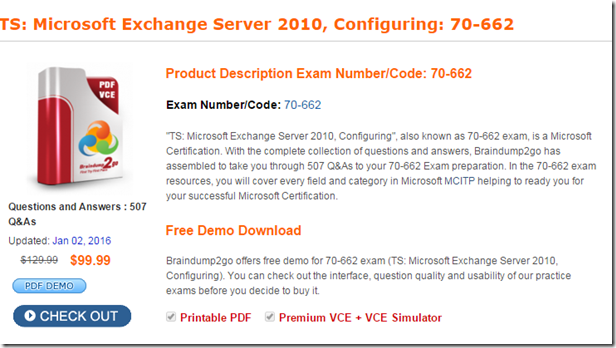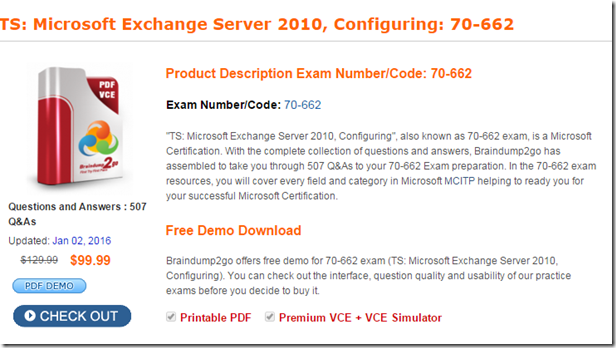[Braindump2go] Microsoft 70-662 Study Guide Free Version (281-290)
MICROSOFT NEWS: 70-662 Exam Questions has been Updated Today! Get Latest 70-662 VCE and 70-662 PDF Instantly! Welcome to Download the Newest Braindump2go 70-662 VCE&70-662 PDF Dumps: http://www.braindump2go.com/70-662.html (507 Q&As)
Quick and Effective Microsoft 70-662 Exam Preparation Options – Braindump2go new released 70-662 Exam Dumps Questions! Microsoft Official 70-662 relevant practice tests are available for Instant downloading at Braindump2go! PDF and VCE Formates, easy to use and install! 100% Success Achievement Guaranteed!
Exam Code: 70-662
Exam Name TS: Microsoft Exchange Server 2010, Configuring
Certification Provider: Microsoft
Corresponding Certifications: MCITP, MCITP: Enterprise Messaging Administrator on Exchange 2010, MCTS, MCTS: Microsoft Exchange Server 2010, Configuring
70-662 Dumps,70-662 PDF,70-662 PDF eBook,70-662 Braindump,70-662 Study Guide,70-662 Book,70-662 Practice Test,70-662 Dumps PDF,70-662 VCE,70-662 VCE Dumps,70-662 Valid Dumps,70-662 Exam Questions Free,70-662 Dumps,70-662 Free Dumps,70-662 Questions and Answers Free,70-662 Braindump PDF,70-662 Braindump VCE,70-662 Preparation

QUESTION 281
You have an Exchange Server 2010 Service Pack 1 (SP1) organization that contains four servers.
The servers are configured as shown in the following table.
You enable safelist aggregation.
You need to verify whether Edge1 and Edge2 received the list of safe senders.
Which tool should you use?

A. Active Directory Service Interfaces Editor (ADSI Edit)
B. the Test-ReplicationHealth cmdlet
C. the Exchange Control Panel (ECP)
D. the Exchange Management Console (EMC)
Answer: A
Explanation:
http://technet.microsoft.com/en-us/library/aa998280.aspx
There are three safelist collection attributes for each user object:
msExchSafeRecipientsHash
This attribute stores the hash of the Safe Recipients List collection for the user. msExchSafeSendersHash
This attribute stores the hash of the Safe Senders List collection for the user msExchBlockedSendersHash
This attribute stores the hash of the Blocked Senders List collection for the user.

QUESTION 282
Drag and Drop Question
You have an Exchange Server 2010 Service Pact l (SP1) organization that contains an Edge Transport server.
The server is located m the perime network and contains an Edge Subscription.
Your company has a security policy that has the following requirements:
– All email messages sent to the organization must be archived on a company-owned server.
– After the email messages are archived, the messages must be forwarded to a hosted anti-spam service provider.
You need to configure the Exchange organization to meet the requirements of the security policy, what should you do?

Answer:

Explanation:
1. Create a Send connector named PROVIDER that has a custom address space.
2. Link the RECEIVE_CUSTOM Receive connector to the PROVIDER Send connector.
QUESTION 283
Hotspot Question
You need to modify the internal URL of the Exchange ActiueSync virtual directory.
Which node should you select from the Exchange Management Console (EMC) to make the modification? To answer, select the appropriate node in the answer area.

Answer:

Explanation:
Select Sever Configuration -> Client Access

QUESTION 284
Drag and Drop Question
You have an Exchange Server 201O Service Pack 1 (SP1) organization named contoso.com. The organization contains two Client Access servers named CAS1 and CAS2.
CAS1 and CAS2 are members of a Client Access array named casarray1.contoso.com.
The hardware on CAS1 fails.
You need to restore CAS1.
You install Windows Server 2008 R2 on a new server named CAS1.
What should you do next? To answer, move the appropriate actions from the list of actions to the answer area and arrange them in the correct order.

Answer:

Explanation:
1. Reset the computer account of CAS1.
2. Join CAS1 to contoso.com.
3. From the Exchange Server 2010 SP1 installation files, run setup /m:recoverserver.
Reference:
http://technet.microsoft.com/en-us/library/dd876880.aspx
QUESTION 285
Drag and Drop Question
You have an Exchange Server 2010 SP1 organization named contoso.com.
You need to ensure that all of the e-mail messages sent between the Exchange mailboxes are Information Rights Management (IRM)-protected automatically.
What should you do? To answer, move the appropriate actions from the list of actions to the answer area and arrange them in the correct order.

Answer:

Explanation:
Drag and drop in these sequences:
1: Install Active Directory Rights Management Services (AD RMS),
2: Run the Set-IRMConguration cmdlet,
3: Create a transport rule.
http://technet.microsoft.com/en-us/library/dd876938.aspx
QUESTION 286
You have an Exchange Server 2010 Service Pack 1 (SP1) organization.
All mailbox-enabled users access their mailbox by using Microsoft Outlook 2010.
You create a custom message classification.
You need to ensure that all of the mailbox-enable users can use the message classification from Outlook 2010.
What should you do? (Choose all that apply.)
A. Create a retention policy.
B. Deploy Classifications.xml to each client computer,
C. Create a retention tag.
D. Modify the Outlook 2010 profile settings of each mailbox-enabled user,
E. Modify the registry of each client computer
F. Create a transport rule that uses the message classification as a condition.
Answer: BE
Explanation:
http://technet.microsoft.com/en-us/library/aa998271.aspx
Open the Shell and run the following script from the Program Files\Microsoft\Exchange Server\V14\Scripts directory:
/Export-OutlookClassification.ps1 > c:\exports\Classifications.xml
Copy Classifications.xml to c:\ root of the client
The following registry key and related registry settings must be created on all Outlook 2007 computers from which users who have mailboxes hosted on Exchange 2010 send message classifications.
[HKEY_CURRENT_USER\Software\Microsoft\Office\12.0\Common\Policy] “AdminClassificationPath”=”c:\\Classifications.xml”
“EnableClassifications”=dword:00000001
“TrustClassifications”=dword:00000001
QUESTION 287
You have an Exchange Server 2010 Service Pack 1 (SP1) organization.
The organization contains a Hub Transport server named Server1 and an Edge Transport server named Server2.
All servers are configured to use an internal DNS server named DNS1 for host name resolution. You configure an Edge Subscription from Server1 to Server2.
You need to ensure that the DNS server at the company’s Internet service provider (ISP) is used to resolve the SMTP domains of the email messages sent to the Internet.
What should you do?
A. From the Exchange Management Shell, run the Set-TransportConfig cmdlet,
B. From the Exchange Management Console (EMC), create a transport rule.
C. From the Exchange Management Shell, run the Set-TransportServer cmdlet.
D. From the Exchange Management Console (EMC), modify the properties of the remote
domain.
E. From the Exchange Management Console (EMC), disable the IP Block List feature.
F. From the Exchange Management Console (EMC), modify the properties of the accepted
domain.
G. From the Exchange Management Shell, run the Set-TransportAgent cmdlet.
H. From the Exchange Management Shell, run the Set-ReceiveConnector cmdlet.
Answer: C
QUESTION 288
You have an Exchange Server 2010 Service Pack 1 (SP1) organization.
The organization contains two Hub Transport servers named Hub1 and Hub2.
The network adapter on Hub1 fails.
You discover that 850 email messages are stuck in the Hub1 transport queues.
You plan to export the email messages from Hub1 to Hub2.
What should you do first?
A. Run the Suspend-Queue cmdlet.
B. Run the Export-Message cmdlet.
C. Stop the Microsoft Exchange Transport service.
D. Stop the Microsoft Exchange Mail Submission service.
Answer: A
QUESTION 289
Hotspot Question
You have an Exchange Server 2010 Service Pack l (SP1) organization.
You create a mailbox named Compliance.
You need to ensure that a copy of each email message sent from a user named User1 is sent to the Compliance mailbox.
Which node should you select from the Exchange Management Console (EMC) to make the modification? To answer, select the appropriate node in the answer area.

Answer:

Explanation:
Select the “Mailbox” node under “Recipient Configuration”.
QUESTION 290
Your company has three departments named Sales, Marketing, and Finance.
The network contains an Active Directory domain named contoso.com.
You have an Exchange Server 2010 Service Pack 1 (SP1) organization that contains the servers configured as shown in the following table:
You Create an Edge Subscription for Server2.
You plan to encrypt all of the email sent to a partner company named A. Datum Corporation by using Transport Layer Security (TLS).
You need to prepare Server1 for the planned configuration.
What should you create?

A. a new Receive connector
B. a new federation trust
C. a new Edge Subscription
D. an attachment filter entry
E. an accepted domain
F. an Edge Transport rule
G. a new journal rule
H. a new Send connector
I. a remote domain
J. an IP Block List Provider
K. a Hub Transport rule
L. a new organization relationship
Answer: H
Explanation:
http://technet.microsoft.com/en-us/library/aa997285.aspx
Partner Send connectors send e-mail to partner domains. This connector is configured to only allow connections to servers that authenticate with Transport Layer Security (TLS) certificates for SMTP domains included in the list of domain-secured domains. You can add domains to this list by using the TLSSendDomainSecureList parameter in the Set-TransportConfig command. Reference:
http://technet.microsoft.com/en-us/library/aa997285.aspx
http://technet.microsoft.com/en-us/library/bb124392.aspx
http://technet.microsoft.com/en-us/library/bb123543.aspx
Braindump2go Offers PDF & VCE Dumps Download for New Released Microsoft 70-662 Exam! 100% Exam Success Guaranteed OR Full Money Back Instantly!

FREE DOWNLOAD: NEW UPDATED 70-662 PDF Dumps &70-662 VCE Dumps from Braindump2go: http://www.braindump2go.com/70-662.html 507 Q&As)